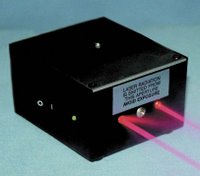Neurons and Silicon talking
Some European researchers have managed to create an
interface between mammalian neurons and silicon chips. This is a first step towards the development of advanced technologies that combine silicon circuits with a mammal's nervous system.
Fancy!
25 Gb/s VCSEL Chip developed by NEC
Who says we do not know where we're going: from the
press release :"The largest issue in current supercomputer performance is the data transmission speed among LSI chips or boards in comparison to the data processing speed in LSI chips. Replacing the electrical signals with optical signals is a logical move as optical interconnection enables high-speed operation and high-density mounting. Among semiconductor lasers, VCSEL is advantageous since it can operate at low power and carry out high-density integration. Therefore, the features of the newly developed VCSEL are very beneficial to next-generation supercomputing systems,
in which high-density optical interconnection will be carried out between CPUs and memories". I would say our lab is eminently positioned to take advantage of that fact !
How to eat Sushi..
did you ever wonder how to perfectly eat Sushi (and how to act in a Sushi bar)? Here is a course by the
Japan Culture Lab . Enjoy :-) ..
Crimes and lasers?

Following my previous posts about non standard uses of optics, here you have an interesting
article about a device with two lasers that, mounted on a photo camera, allows you to measure distances in a picture. Currently it's being used by FBI in crime investigations, but was originally developed by NASA to check damages in the space shuttle. Not a lot of technical information in there, though...
Brussels from Space
BrusselNieuws has launched a new service that I can warmly recommend:
Under this
link you can find small files which integrate into Google Earth and add special places and links onto the view on Bussels. For instance you get a lot of Restaurants with a description, the Metro lines, the major spots, etc. A very nice service..recommended!
Ingo
Who said sci-fi holograms could not exist?
Displaying 3D images (composed of dot arrays) in the air, by using the plasma emission phenomenon near the focal point of focused laser light. Cool, eh?

More info on this
article from the Keio University and the AIST Institute, both from Japan.


 Feed
Feed
